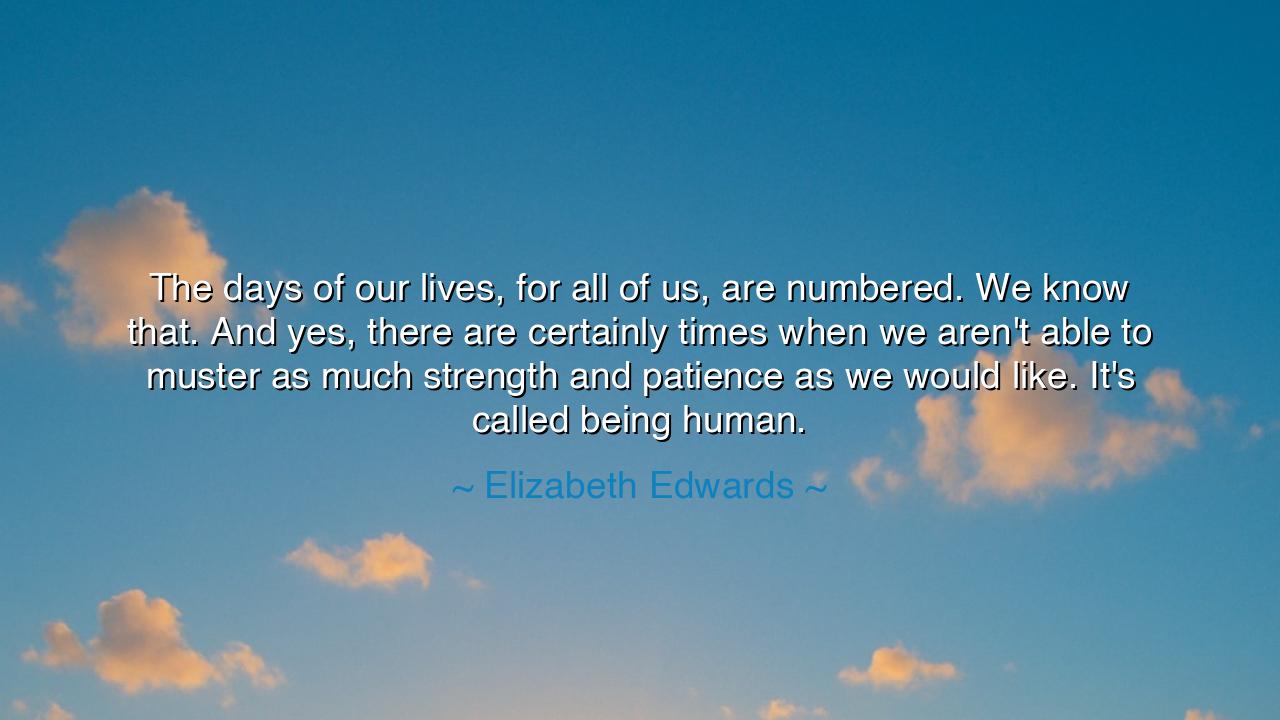
The days of our lives, for all of us, are numbered. We know
The days of our lives, for all of us, are numbered. We know that. And yes, there are certainly times when we aren't able to muster as much strength and patience as we would like. It's called being human.






“The days of our lives, for all of us, are numbered. We know that. And yes, there are certainly times when we aren't able to muster as much strength and patience as we would like. It's called being human.” Thus spoke Elizabeth Edwards, a woman who walked through trials of loss, illness, and betrayal, yet carried herself with grace and honesty. In her words lies the wisdom of the ancients, who never denied mortality, nor pretended that men and women were gods. She reminds us that to live is to walk with the knowledge of an end, and to falter at times is not weakness, but the mark of our humanity.
The ancients taught often of the brevity of life. The Stoics repeated, memento mori—“remember you must die.” They knew that the days of our lives are numbered, not infinite, and that it is this numbering which gives them weight and urgency. To forget our mortality is to live in illusion; to accept it is to live with truth. Elizabeth Edwards, speaking in the shadow of her own illness, framed this not with despair, but with compassion: to know our limits, to accept our moments of impatience and weakness, is to embrace what it means to be human.
For there is great danger in believing that strength must always be constant. Even the greatest heroes of old—Hercules, Achilles, Odysseus—knew weariness, doubt, and grief. To demand perfection of the self is to set upon the shoulders a burden heavier than stone. Edwards reminds us that though we strive for strength and patience, we must also accept that we will sometimes stumble. This is not failure, but the natural rhythm of life. For in falling and rising again, the soul is shaped.
Consider the story of Abraham Lincoln, who bore both the agony of personal sorrow and the weight of civil war. He was not always strong; often he sank into melancholy, doubting himself and grieving losses too heavy for one man. Yet even in those moments of frailty, he did not cease to be a leader. His humanity, his vulnerability, became the well from which his compassion flowed. In him we see that to falter is not to be defeated, but to walk honestly in the truth that strength is never unbroken.
So too Elizabeth Edwards, who faced the death of a child, the betrayal of a husband, and the sentence of a terminal illness. She did not pretend always to be steadfast; she admitted her sorrow, her exhaustion, her anger. And yet in naming these, she gave courage to others. For she showed that true dignity is not in wearing the mask of perfection, but in revealing the face of a mortal soul who, even when weary, continues on.
O children of tomorrow, learn this: do not despise your moments of weakness. Do not curse the times when your patience breaks or your strength falters. This is the essence of being human—to be fragile, and yet to keep moving forward. The gods may not tire, but men and women do. And in that frailty lies the beauty of our race: that despite knowing our days are numbered, we still love, still build, still dream, still rise again.
The lesson is plain: embrace both your striving and your stumbling. When you are strong, use your strength to serve. When you are weak, let humility teach you compassion. Practically, let each person do this: reflect daily on the brevity of life, not to despair, but to cherish each moment. Allow yourself rest when weary, patience when impatient, forgiveness when you fall short. In doing so, you will live not as a god, but as a true human—finite, flawed, yet radiant with meaning.
Thus remember Elizabeth Edwards’ words: “The days of our lives are numbered… It’s called being human.” Let them be a balm to your heart. For mortality is not a curse, but the very frame that makes each day precious. And imperfection is not shameful, but the proof that we are alive. To live with both strength and weakness, with both patience and faltering, is the heroic art of humanity itself.






AAdministratorAdministrator
Welcome, honored guests. Please leave a comment, we will respond soon